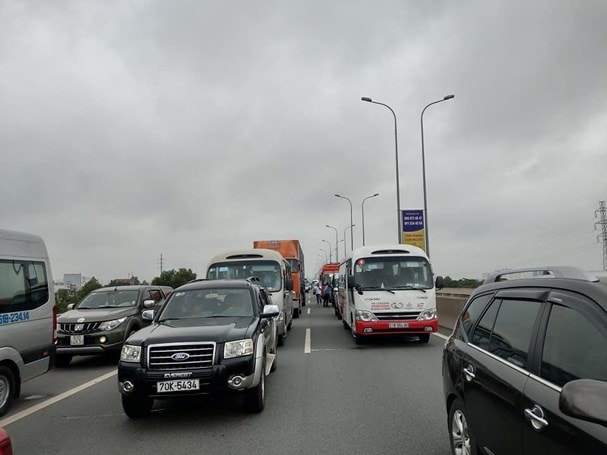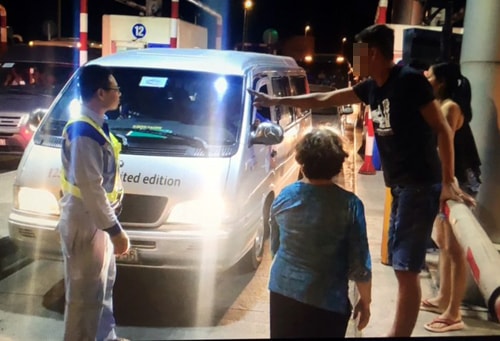The General Department of Roads requests VEC to withdraw the decision "refusing to serve cars"
VEC's refusal to serve cars on the four highways it manages is considered illegal.
On February 12, Mr. Nguyen Van Huyen (General Director of the Vietnam Road Administration) said that VEC's decision to permanently refuse service to vehicles was beyond its authority and illegal. The expressway investor only has the right to prevent and sanction overloaded vehicles. As for passenger vans and cars with 9 seats or less, if they violate, they are under the jurisdiction of state management agencies such as the police and the Ministry of Transport.
"The General Department of Roads has asked VEC to report the incident. If this unit decides to refuse service, it will request the withdrawal of the illegal document," said Mr. Huyen.
|
The driver stopped the car at the cabin on the Ho Chi Minh City - Long Thanh highway and asked to leave the station. |
Talking about the permanent refusal to serve two cars with HCMC license platesRegarding the "disruptive" drivers at the Long Thanh - Dau Giay expressway toll station, Mr. Nguyen Van Nhi (Deputy General Director of Vietnam Expressway Corporation, VEC) said that this is only a proposal from the expressway management unit. VEC has not yet decided to ban these two vehicles.
However, according to Mr. Nhi, over the years the unit has decided to refuse service to thousands of vehicles on the highway due to: non-compliance with investor regulations, traffic violations, drivers picking up passengers along the way, cases of disturbance... Among them, many vehicles were permanently refused.
"We consider the level of violation to make a decision. For minor violations, a 5-day service denial penalty will be applied; for repeat violations, a 15-day penalty will be applied. In cases of serious violations or repeated violations, VEC will permanently refuse service," said Mr. Nhi.
 |
Traffic congestion on Long Thanh Expressway in a recent traffic incident. |
The Deputy General Director of VEC said that the unit bases on the Civil Law to issue sanctions. "This is the relationship between two parties providing services and using services. If the driver enters the highway, he must accept the regulations of the owner," Mr. Nhi said, adding that VEC does so to limit violations on the highway, ensuring safety and smooth traffic for vehicles.
From a legal perspective, law experts believe that Vietnam Expressway Engineering Services Joint Stock Company - VEC E (managing the Ho Chi Minh City - Long Thanh - Dau Giay Expressway, a subsidiary of VEC) refused to serve the two vehicles based on internal regulations, not legal regulations, so it has no practical application value for vehicle owners or vehicles on the highway. Moreover, the highway is a public road that is not owned by the investor, but the investor only has the right to exploit it.
As the highway operator, when detecting vehicle violations, the investor must report to the traffic police for handling. In case there are signs of disturbing public order or destroying property, the authorities will handle it according to the law.
In the report sent to the Vietnam Road AdministrationOn the same afternoon, VEC said it did not approve VEC E's proposal due to insufficient legal basis. VEC will review internal regulations and procedures to comply with the law.
On February 11, VEC E announced its "permanent refusal to serve" two cars with Saigon license plates on four expressways it manages and operates: Ho Chi Minh City - Long Thanh - Dau Giay; Cau Gie - Ninh Binh; Noi Bai - Lao Cai; Da Nang - Quang Ngai.
The reason given by VEC E was: the drivers of these two vehicles did not pay the tickets and tolls, and shouted loudly when the highway management unit refused to release the station. When invited into the office, these people also destroyed property and chased away the toll station staff.
VEC E's refusal to serve these two vehicles is based on Decision 13/2019 - Regulations on refusing to serve and re-serving vehicles that violate traffic rules when participating in routes managed by VEC.

